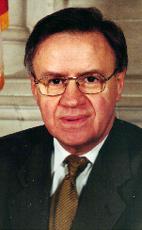Mr. Speaker, for some time now the House has been addressing income tax, what can be done, and what cannot. But I think that in a debate such as this one, a retrospective might be necessary, to look at what is already in place before making any changes to the Income Tax Act.
It has been some years since Canada had the opportunity to have a royal commission into its taxation system. One was struck in 1962, and dubbed the Carter Commission. That commission was chaired by a man named Kenneth Carter. Mr. Carter worked for over four and a half years before putting forward recommendations to correct our tax system and make it fairer and more equitable.
What is interesting is what happened when the Carter report was released. This truly was a revolutionary document on taxation. The recommendations on our tax system were so well thought out that Harvard University, in the United States, decided that this program could be used in industrialized countries to show how tax systems can be reformed so as to make them fairer and more equitable.
Unfortunately, for reasons that we do not know, it was decided not to publish the commission's report. This was rather strange but, for the first time in the history of our country, the report of a royal commission was not published. Canadians were not informed of the recommendations made by these economists. People who might have wished to examine these recommendations to improve our tax system were not able to do so.
Also, after the commission completed its Canadian tour, there seemed to be a consensus that the report was an important discussion paper. But this was completely ignored, until now.
Although the royal commission now dates back more than 30 years, consideration was given to a number of the Carter Commission's findings in 1992 or 1993, I think. While the recommendations made at the time still hold true today, unfortunately, once again, they were ignored.
Regardless of which party is in government, the problem has never been faced that we need an in-depth reform before examining any ideas, whether a single rate of 20% or tax deductions for homemakers. There is a great deal of confusion surrounding the Income Tax Act. The reform must be done in detail.
I would just like to raise a few points to demonstrate the distortions that have been introduced into our system over the years. From 1984 to 1988, there was about a 10% increase in the income tax paid by people of average income. That was a substantial increase. At the same time, between 1984 and 1988, there was a barely 6% increase in the income tax paid by those who were better off.
The distortion in the income tax system for these two categories of taxpayers is immediately obvious. I am giving just a few points. We are aware that there are many more. Four or five years ago, witnesses appearing before the Finance Committee indicated that there were 75 to 80 items needing correction in the Income Tax Act.
One of the examples they gave was that of people earning in excess of $100,000, who benefited most generously from capital gains exemptions. In all, such persons had refunds of over $1 billion. Fifty one per cent of people with an income over $100,000 benefited. However, of those with an income of $50,000 or less, only 8% benefited from capital gains.
That shows that the richest enjoy the greatest benefits. They are more likely to pay less income tax and obviously to become ever richer.
Without going into detail, I wanted just to point out a few things. I have a lot here to show that, first and foremost, and it must be repeated, we need an in depth reform, as we had in 1962, either through a royal commission or some other means, to look thoroughly at ways to correct the gaps in our system. If every year only adjustments are made, we will never have a fair and equitable system.
Over time, our fellow citizens must be convinced to tell their representatives that we need a global solution to the problem, that it is not enough to correct it one page at a time, given that there are over 1,400 pages in the Income Tax Act.
Another matter that does not come directly under the Income Tax Act is the fact that we have a money policy that proved to be disastrous for us during the period starting in 1985. For a number of years, the Bank of Canada set the interest rates at four percentage points, sometimes five percentage points higher than those in the United States. It caused our national debt to grow by leaps and bounds.
In 1984, our national debt was $160 billion; nine years later, it had reached $460 billion. The debt was increasing every year and the government had to collect more and more taxes to pay the interest on it.
Again, it is not simply a matter of amending minor provisions of the Income Tax Act. We must consider all the components of our national tax system. We need a comprehensive reform of our monetary policy, which is a critical tool for the government. Very few know how this policy works, or why it is in place.
Again, and I conclude on this note, the most important thing we can do for our fellow Canadians is to urge this government, and I have done it many times, to undertake a comprehensive tax reform. We must not merely ask for changes here and there. We must look at the overall picture and decide that we need another commission such as the one we had in the past.
If, at the time, we had followed up on that revolutionary document, perhaps we would have a solution to make our tax system as fair and equitable as possible for all Canadians.

